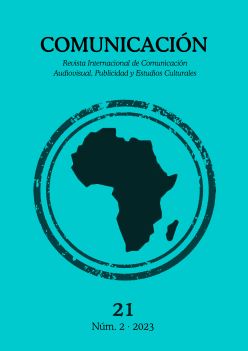Resumen
Si bien la participación de las mujeres en las revoluciones africanas, especialmente en Argelia, es un hecho reconocido a lo largo de la historia (Bedjaoui, 2020), al observar películas producidas en el contexto africano que buscan reconstruir tales acontecimientos, es posible notar ausencias en cuanto a la forma en que se representó esta participación femenina. Por ello, en el presente trabajo proponemos una aproximación basada en las películas La Nouba des femmes du Mont Chenoua (1975-1977) y La Zerda, les chants de l'oubli (1978-1982), dirigidas por la cineasta argelina Assia Djebar (1936-2015), partiendo de la hipótesis de que tales producciones, además de permitir otras formas de representar a las mujeres en la revolución argelina, también invitan a otra comprensión de la narrativa histórica al apropiarse de elementos de las tradiciones orales como recurso retórico en la narrativa cinematográfica (Soulez, 2011). Un proceso que comienza con la valoración de cuentos y canciones como fuentes inspiradoras en la composición de la narrativa cinematográfica y que, a través del análisis, ofrece posibles aportes a la forma en que pensamos sobre la oralidad en el cine africano, en general, y específicamente, sobre el potencial de la voz (Chion, 1992; Châteauvert, 1996), especialmente femenina, a la hora de desencadenar recuerdos, a través de la narrativa cinematográfica en pro de la revisión de hechos históricos.
Citas
Bedjaoui, Ahmed (2020). Women in Cinematic Representations of the Liberation War, en Cinema and the Algerian War of Independence (pp. 159-179). Londres: Palgrave Macmillan.
Châteauvert, Jean (1996). Le son au cinéma, en Des mot à l’image. La voix over au cinéma (pp. 97-122). Paris/Québec: Méridiens Klincksieck/Nuit Blanche Éditeur.
Chion, Michel (1992). Wasted words, en Rich Altman (ed). Sound theory/Sound practice (pp. 104-112). Londres, Nueva York: Routledge.
Cinema Argelino (2001). Organizado por Antonio Rodrigues. Lisboa: Cinemateca Portuguesa-Museu do Cinema.
Djebar, Assia (1975-1977). La Nouba des femmes du Mont Chenoua. Argelia: Radiodiffusion Télévision Algérienne (RTA), 115 min.
Djebar, Assia (1978-1982). La Zerda ou les chants de l’oubli. Argelia: Radiodiffusion Télévision Algérienne (RTA), 59 min.
Djebar, Assia (1989). Un regard de femme, Le Courier de l’Unesco (Images de l’AUTRE au cinéma), pp. 34-37.
Djebar, Assia (2020). My need for cinema. Trad. Sis Matthé. Sabzian (Dossier Out of Shadows: Assia Djebar). Publicado originalmente en “Écrit/Écran: Assia Djebar-Sembène Ousmane” [Colloquium], University of Victoria, Vancouver (1994). https://www.sabzian.be/text/my-needfor-cinema
Fanon, Josie (1977). A woman, a film, a different gaze. Trad. Sis Matthé, en Dossier Out of shadows: Assia Djebar. https://www.sabzian.be/text/a-woman-a-film-a-different-gaze
Léon, Maryse y, Monique Martineau Hennebelle (2021). “I was looking for a musical language”: two interviews with Assia Djebar. Trad. Veva Leye. Sabzian (Dossier Out of Shadows: Assia Djebar). Publicadas originalmente en CinémAction (1979/1981). https://www.sabzian.be/text/%E2%80%9Ci-was-looking-for-a-musical-language%E2%80%9D
Lima, Morgana Gama de (2020). Griots modernos: por uma compreensão do uso de alegorias como recurso retórico em filmes africanos. Tese (Doctorado). Salvador: Universidade Federal da Bahia.
Maia, Guilherme (2020). Canção popular e cinema: memórias, identidades e um falso problema, en Yanet Aguilera. Mordaças no cinema da América Latina (pp. 149-175). São Paulo: Discurso Editorial.
Maia, Guilherme y, Gama de Lima, Morgana (2022). Ecos pós-coloniais em dois filmes africanos: as canções de Soleil Ô e Touki Bouki. Revista Eco-Pós, 25(1), pp. 16–38. https://doi.org/10.29146/ecops.v25i1.27844
Mambéty, Djibril Diop (1998). The Hyena’s Last Laugh. [Entrevista concedida a] Nwachukwu Frank Ukadike, Transition 78, v. 8, n. 2, pp. 136-153. http://www.jstor.org/stable/2903181.
Mami, Fouad (2022). Zoulikha, Forgotten Freedom Fighter of the Algerian War, Markaz Review, https://themarkaz.org/zoulikha-forgotten-freedom-fighter-of-the-algerian-war/
Martin, Florence (2011). Assia Djebar’s Transvergent Nuba: The Nuba of the Women of Mount Chenoua (Algeria, 1978) en Screens and Veils: Maghrebi Women’s Cinema (pp. 43–62). Indiana University Press. http://www.jstor.org/stable/j.ctt16gzk45.5
Nora, Pierre (1993). Entre memória e história: a problemática dos lugares, Projeto História. Revista do Programa de Estudos Pós-Graduados em História e do Departamento de História da PUC-SP, n. 10. São Paulo.
Mortimer, Mildred (1997). Nouveau regard, nouvelle parole: le cinéma d’Assia Djebar, en Kenneth Harrow. With open eyes: women and African cinema (pp. 93-109). Amsterdã, Atlanta: Rodopi.
Pfaff, Françoise (1993). The Uniqueness of Ousmane Sembene’s Cinema, Contributions in Black Studies, v. 11 (Ousmane Sembene: Dialogues with Critics & Writers), artigo 3, pp. 13-19.
Ricoeur, Paul (2007). História e tempo, en A memória, a história, o esquecimento (pp. 357-422). Trad. Alain François. Campinas, SP: Unicamp.
Rosenstone, Robert (1995). Review: Revisioning History: Contemporary Filmmakers and the Construction of the past, Comparative Studies in Society and History, v. 32, n. 4, pp. 822-837.
Robatto, Lucas (2001). Arnold Schönberg: Pierrot Lunaire op. 21 Nr. 7 “Der kranke Mond” (Voz e Flauta). ICTUS Music Journal, v. 3. https://doi.org/10.9771/ictus.v3i0.34215
Said, Edward (2011). Territórios sobrepostos, histórias entrelaçadas, en Cultura e imperialismo (pp. 34-116). Trad. Denise Bottman. São Paulo: Companhia das Letras.
Soares, Vera Lucia (1995). A escritura dos silêncios: Assia Djebar e o discurso do colonizado no feminino. Tese. Niterói: Pós-Graduação em História da Universidade Federal Fluminense.
Soulez, Guillaume (2011). Quand le film nous parle: rhétorique, cinéma, télévision. Paris: PUF.
Tomaselli, Keyan y, Eke, Maureen (1995). Perspectives on orality in African Cinema, Oral Tradition,10/1, p.111-128. https://journal.oraltradition.org/wp-content/uploads/files/articles/10i/9_tomaselli_eke.pdf
Van de peer, Stefanie (2011). Assia Djebar: Algerian Images-son in experimental documentaries, en Negotiating Dissidence, the Pioneering Women of Arab Documentary (pp. 110-139). Edinburgh: Edinburgh University Press.

Esta obra está bajo una licencia internacional Creative Commons Atribución-NoComercial-CompartirIgual 4.0.
Derechos de autor 2023 Morgana Gama de Lima, Guilherme Maia

